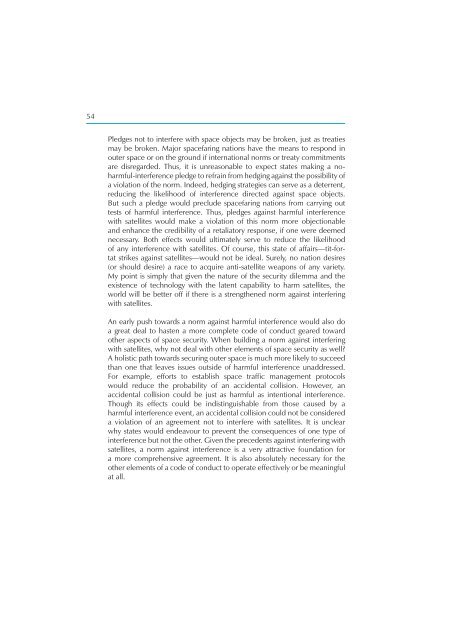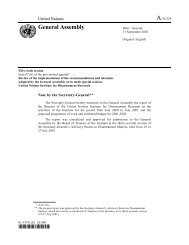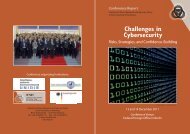Security in Space The Next Generation - UNIDIR
Security in Space The Next Generation - UNIDIR
Security in Space The Next Generation - UNIDIR
Create successful ePaper yourself
Turn your PDF publications into a flip-book with our unique Google optimized e-Paper software.
54<br />
Pledges not to <strong>in</strong>terfere with space objects may be broken, just as treaties<br />
may be broken. Major spacefar<strong>in</strong>g nations have the means to respond <strong>in</strong><br />
outer space or on the ground if <strong>in</strong>ternational norms or treaty commitments<br />
are disregarded. Thus, it is unreasonable to expect states mak<strong>in</strong>g a noharmful-<strong>in</strong>terference<br />
pledge to refra<strong>in</strong> from hedg<strong>in</strong>g aga<strong>in</strong>st the possibility of<br />
a violation of the norm. Indeed, hedg<strong>in</strong>g strategies can serve as a deterrent,<br />
reduc<strong>in</strong>g the likelihood of <strong>in</strong>terference directed aga<strong>in</strong>st space objects.<br />
But such a pledge would preclude spacefar<strong>in</strong>g nations from carry<strong>in</strong>g out<br />
tests of harmful <strong>in</strong>terference. Thus, pledges aga<strong>in</strong>st harmful <strong>in</strong>terference<br />
with satellites would make a violation of this norm more objectionable<br />
and enhance the credibility of a retaliatory response, if one were deemed<br />
necessary. Both effects would ultimately serve to reduce the likelihood<br />
of any <strong>in</strong>terference with satellites. Of course, this state of affairs—tit-fortat<br />
strikes aga<strong>in</strong>st satellites—would not be ideal. Surely, no nation desires<br />
(or should desire) a race to acquire anti-satellite weapons of any variety.<br />
My po<strong>in</strong>t is simply that given the nature of the security dilemma and the<br />
existence of technology with the latent capability to harm satellites, the<br />
world will be better off if there is a strengthened norm aga<strong>in</strong>st <strong>in</strong>terfer<strong>in</strong>g<br />
with satellites.<br />
An early push towards a norm aga<strong>in</strong>st harmful <strong>in</strong>terference would also do<br />
a great deal to hasten a more complete code of conduct geared toward<br />
other aspects of space security. When build<strong>in</strong>g a norm aga<strong>in</strong>st <strong>in</strong>terfer<strong>in</strong>g<br />
with satellites, why not deal with other elements of space security as well?<br />
A holistic path towards secur<strong>in</strong>g outer space is much more likely to succeed<br />
than one that leaves issues outside of harmful <strong>in</strong>terference unaddressed.<br />
For example, efforts to establish space traffi c management protocols<br />
would reduce the probability of an accidental collision. However, an<br />
accidental collision could be just as harmful as <strong>in</strong>tentional <strong>in</strong>terference.<br />
Though its effects could be <strong>in</strong>dist<strong>in</strong>guishable from those caused by a<br />
harmful <strong>in</strong>terference event, an accidental collision could not be considered<br />
a violation of an agreement not to <strong>in</strong>terfere with satellites. It is unclear<br />
why states would endeavour to prevent the consequences of one type of<br />
<strong>in</strong>terference but not the other. Given the precedents aga<strong>in</strong>st <strong>in</strong>terfer<strong>in</strong>g with<br />
satellites, a norm aga<strong>in</strong>st <strong>in</strong>terference is a very attractive foundation for<br />
a more comprehensive agreement. It is also absolutely necessary for the<br />
other elements of a code of conduct to operate effectively or be mean<strong>in</strong>gful<br />
at all.








